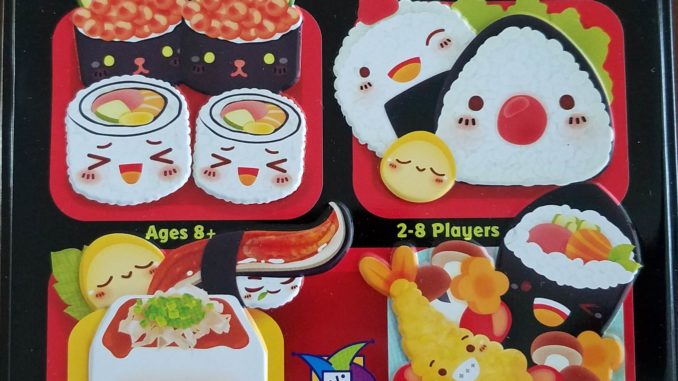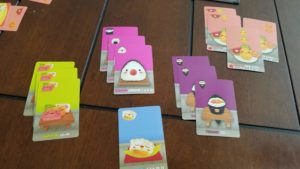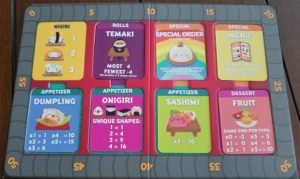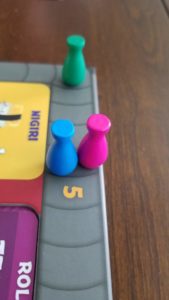
A friend of ours loves this game. And she’s not the biggest fan of board games, more of a roleplay gamer. We played it and my son fell instantly in love. Always asking to play it when we went over there. So we picked it up for Christmas and have played it quite a few times since. And that has nothing to do with being cooped up at home for several months straight.
Gameplay- A
 At its core, this is a card passing game similar to Seven Wonders. Each turn, you have a hand of cards and have to choose one of them to play. Then you pass the hand off to another player and get a new hand. You’ll have to balance picking the best card at the moment with planning what you’ll play when you see that hand again later.
At its core, this is a card passing game similar to Seven Wonders. Each turn, you have a hand of cards and have to choose one of them to play. Then you pass the hand off to another player and get a new hand. You’ll have to balance picking the best card at the moment with planning what you’ll play when you see that hand again later.
You play three rounds. Each round consists of a fixed number of turns. At the start of a round, cards are dealt out to every player. This will be their starting hand and the number of cards in the hand is the number of cards that will be played this round. Between rounds, all the cards, except played dessert cards, are gathered up, more dessert cards are added to the deck, shuffled and dealt back out. Not all the cards are dealt out each round so you never know exactly how many of each card are out there (until you’ve seen each hand at least).
 The game has a variety of cards that all score in vastly different ways. Some are straightforward and worth a fixed number of points. Others are worth points, but only if no one else plays another copy of that card this turn. Some provide bonus points to other cards. Many provide points if you get a certain number of copies but give you nothing if you are above or below a threshold. All this combines to give you a lot of choices to make and strategies to adopt.
The game has a variety of cards that all score in vastly different ways. Some are straightforward and worth a fixed number of points. Others are worth points, but only if no one else plays another copy of that card this turn. Some provide bonus points to other cards. Many provide points if you get a certain number of copies but give you nothing if you are above or below a threshold. All this combines to give you a lot of choices to make and strategies to adopt.
The cards are organized into types; appetizer, rolls, special, and desserts. Cards with these types all score in a related fashion to each other. Desserts, for example, all score at the end of the game, not each round. Appetizers typically score based on how many of them you have. Often, the more you have the more each is worth. Sometimes, this is upended by scoring within a certain range and being above and below it results in no or negative score. Specials usually enhance other cards. Maybe duplicating a card or giving certain cards a bonus score. Rolls typically score based on actions of other players.
Figuring out which cards to try for is the puzzle of each game. But until you’ve seen each hand, you have no idea what cards are available this round. Using the example setup above, you could go for Sashimi which is worth 10pts for every three played. Then you learn there are only three total dealt this round. If someone else plays one then those cards are worth nothing. You could try to ensure you get the most Temaki to get those four points. You succeed but in the end you realize that it ends up being worth 1pt per card and playing anything else would have much higher value.
A little tactic I’ve hit on is that the best value is three points per card played. Sometimes you can get higher. Like the Sashimi example above is worth 3.3pts per card played and the Onigiri could be worth 4pts per card played if you get all four types. But those carry risks. If you can play a card and get three points, it’s the best move.
Production- A
No complaints about the games material. The cards and board are sturdy. The menu cards are hefty and fit nicely into the game board. Graphics present the necessary information succinctly, allowing you to glance at them for reminders of what they do from a distance. Picture, color, a symbols all work together to convene sometimes complicated meanings simply and mostly successfully.
 To top things off, the game box is well designed for component storage. You have places for each of the different type of cards. This allows for easy cleanup and easy setup. It’s not quite as advanced as Dominion with every card having a designated place but it does the job well.
To top things off, the game box is well designed for component storage. You have places for each of the different type of cards. This allows for easy cleanup and easy setup. It’s not quite as advanced as Dominion with every card having a designated place but it does the job well.
If there’s a complaint, it’s a small one regarding the game board. The scoring track is along the outside of the board. There is not really enough room for two of the player pawns to fit in a number slot at the same time. There’s an easy enough solution, placing the pawns on the table beside the number. When there are multiple pawns though, and the game can have a fair number of players, this can get a little confusing when people are clustered. It’s very easy for the pawns to get bumped or be unsure if they are on space 4 or 5 when off the track on the table.
Theme- B
The game’s theme revolves around preparing a meal of sushi. Whoever makes the best meal, earns the most points, wins. You have different types of sushi; main course, appetizers, desserts. The cards from the different courses generally have similar game effects. Collections of cards to use in for a game are presented as a menu.
Overall, the game presents its theme well. Though, in the end, the theme has little impact on game play. But that’s not really a detriment.
Expansions- None
Sushi Go Party is an upgrade version of an older game called simply Sushi Go. This version has all the same cards as the original but adds many more on top. It also is designed for up to eight players, versus the original max of five. I’d definitely recommend the party version as it seems to have more card variety and therefore more replayability.
Conclusion- A
Sushi-Go Party is a fun, quick game. It’s simple to set up and the basic rules are simple enough to explain. Learning what each of the cards do and how best to use them can some time to master. But you don’t have to master them to have a good time. This is a game you can play without a big, overarching strategy, instead just making the best decision for the hand in front of you at the time.
The game has a lot of replayability due to the wide variety of card types. What works with one combination of cards might not for a slightly different collection. In that way, the game is a less complicated version of Dominion and Seven Wonders with similar mechanics. This makes it as an easy transition to or from those and similar games.
Definitely recommend.
Wayne Basta
Latest posts by Wayne Basta (see all)
- X-Wing Tier List – Rebels - May 10, 2023
